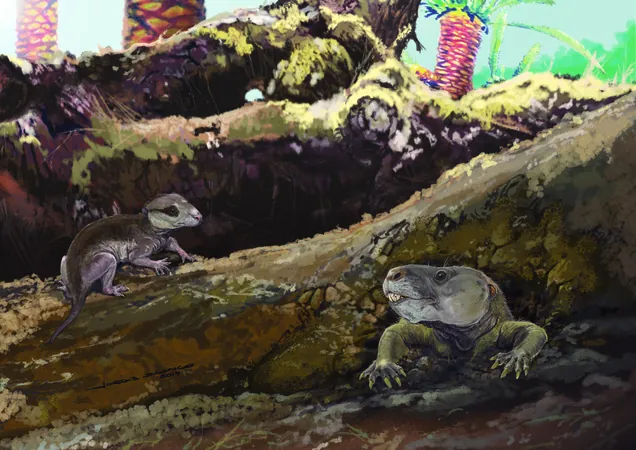
Groundbreaking Brazilian Fossils Rewrite the Story of Mammalian Evolution
2024-09-25
Author: Michael
Groundbreaking Brazilian Fossils Rewrite the Story of Mammalian Evolution
Exciting new discoveries in Brazil have shaken up our understanding of mammalian evolution, revealing jaw-dropping insights into the early stages of jaw and middle ear development. Fossils belonging to the ancient species Brasilodon quadrangularis and Riograndia guaibensis have unveiled evolutionary processes that took place millions of years earlier than scientists previously thought.
Mammals are unique among vertebrates, primarily due to their highly specialized jaw structures and the presence of three distinct middle ear bones. While earlier vertebrates carried only one middle ear bone, this latest study highlights how the mammal ancestors, known as cynodonts, progressively evolved these characteristics over time.
Using sophisticated CT scanning technology, the research team, led by James Rawson from Bristol's School of Earth Sciences, digitally reconstructed the jaw joint of these cynodonts for the first time. They were surprised to find a "mammalian-style" connection between the skull and lower jaw in Riograndia guaibensis, which lived a staggering 17 million years before the oldest known example of this jaw structure. In contrast, Brasilodon quadrangularis, which is more closely related to modern mammals, did not exhibit this jaw joint.
Published in the esteemed journal Nature, this pivotal research suggests that the evolution of the mammalian jaw was not a singular event but rather a complex process that occurred independently across various cynodont groups much earlier than anticipated. The implications of these findings are far-reaching, as they imply that mammalian ancestors were engaged in a series of experimental adaptations pertaining to jaw function, leading to the emergence of traits we now consider characteristic of mammals.
Dr. Agustín Martinelli from the Museo Argentino de Ciencias Naturales in Buenos Aires remarked, "In recent years, these tiny fossil species from Brazil have provided fantastic information that enriches our knowledge about the origins of mammalian features. This is just the tip of the iceberg, and our international collaborations promise even more revelations in the future."
The discovery underscores the significance of South America's fossil record, which is yielding extraordinary insights into mammalian history. Professor Marina Soares from Museu Nacional in Brazil expressed excitement over the region's unparalleled diversity in cynodont species that are closely related to the earliest mammals.
This breakthrough study paves the way for future paleontological research, as scientists aim to unravel the complexities of early jaw joint functionality and its contribution to developing the mammalian form. The findings signify that the evolutionary journey of mammals is far more intricate and diverse than previously understood, igniting a new passion for exploration in the realm of evolutionary biology.
As the research continues, the scientific community remains eager to unveil more secrets locked within these remarkable Brazilian fossils, challenging long-held beliefs and reshaping our understanding of mammalian evolution. Stay tuned for more incredible discoveries that could change everything we know!









 Brasil (PT)
Brasil (PT)
 Canada (EN)
Canada (EN)
 Chile (ES)
Chile (ES)
 España (ES)
España (ES)
 France (FR)
France (FR)
 Hong Kong (EN)
Hong Kong (EN)
 Italia (IT)
Italia (IT)
 日本 (JA)
日本 (JA)
 Magyarország (HU)
Magyarország (HU)
 Norge (NO)
Norge (NO)
 Polska (PL)
Polska (PL)
 Schweiz (DE)
Schweiz (DE)
 Singapore (EN)
Singapore (EN)
 Sverige (SV)
Sverige (SV)
 Suomi (FI)
Suomi (FI)
 Türkiye (TR)
Türkiye (TR)